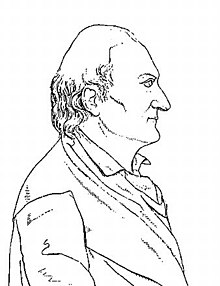Alberto Fortis

Sketch of Alberto Fortis in the Galleria dei letterati ed artisti più illustri delle provincie Austro - Venete che fiorirono nel secolo XVIII. Venezia, 1822, by Bartolommeo Gamba.
Alberto Fortis (1741–1803), was a Venetian writer, naturalist and cartographer.[a]
Contents
1 Life
2 Works
3 Notes
4 References
5 External links
Life
Born Giovanni Battista Fortis[1] (his religious name was Alberto[2]) in Padua on either 9 or 11 of November 1741. He journeyed extensively in Venetian Dalmatia. His best known work is Viaggio in Dalmazia (Travels into Dalmatia), originally published in 1774 and first published in London in 1778.[3][4]
The highlight of the book is the description of "Morlachia", a term used by Fortis for the rural Dalmatian interior to distinguish it from the coastal towns under the influence of Venice.
In his book, Fortis presented his literary discovery "Hasanaginica" as a Morlach (Vlach) ballad. Larry Wolf believed Fortis wrote the ballad as a poetry of South Slavs rather than a poetry of the Morlachs.[5] Fortis believed that the Morlachs preserved their old customs
and clothes. Their ethnographic traits were traditional clothings, use of the gusle musical instrument accompanied with epic singing. He also published several specimens of Morlach songs.
Alberto Fortis's account of the Morlachs, translated into French, English and German brought the Morlachs to the attention of Europe.[6]
The Croatian writer Ivan Lovrić, who wrote Notes on 'Travels in Dalmatia' of Abbe Alberto Fortis, accused Fortis of many factual errors, which he attempted to rectify.[7]Travels into Dalmatia played an important role in bringing the Dalmatian culture to the attention of Europe during the rise of Romantic notions about folklore. Dalmatian hinterlands became epitomized by Hasanaginica, a folk ballad that was first written down by Fortis.[8]
In 1795 Fortis was elected Fellow of the Royal Society in London. He died in Bologna eight years later on 21 October 1803.[3]
Works

Viaggio in Dalmazia dell' Abate Alberto Fortis (Travels into Dalmatia, by Abbe Alberto Fortis) 1774.
Saggio d'osservazioni sopra l'isola di Cherso ed Osero.[9][10]
Travels into Dalmatia; containing general observations on the natural history of that country and the neighbouring islands; the natural productions, arts, manners and customs of the inhabitants: in a series of letters from Abbe Alberto Fortis, first published in London by J. Robson, 1778.[11]
A poetical sketch of the revolutions that have happened in the natural history of our planet intended as a specimen of a philosophical and theological poem, first published in London by B. White, 1786.[12]
Notes
^ Also known as Abbe Alberto Fortis. and also Abate Alberto Fortis. Abate is an Italian spelling of Abbe (Name Origin Research staff 2011)
^ International Musicological Society Congress 1990, p. 1454.
^ International Musicological Society Congress 1993, p. [page needed].
^ ab Ciceran 2011.
^ Addison's Rare Books & Bindery.
^ Larry Wolff, Rise and fall Morlachismo. In: Norman M. Naimark, Holly Case, Stanford University Press, Yugoslavia and Its Historians: Understanding the Balkan Wars of the 1990s, .mw-parser-output cite.citation{font-style:inherit}.mw-parser-output .citation q{quotes:"""""""'""'"}.mw-parser-output .citation .cs1-lock-free a{background:url("//upload.wikimedia.org/wikipedia/commons/thumb/6/65/Lock-green.svg/9px-Lock-green.svg.png")no-repeat;background-position:right .1em center}.mw-parser-output .citation .cs1-lock-limited a,.mw-parser-output .citation .cs1-lock-registration a{background:url("//upload.wikimedia.org/wikipedia/commons/thumb/d/d6/Lock-gray-alt-2.svg/9px-Lock-gray-alt-2.svg.png")no-repeat;background-position:right .1em center}.mw-parser-output .citation .cs1-lock-subscription a{background:url("//upload.wikimedia.org/wikipedia/commons/thumb/a/aa/Lock-red-alt-2.svg/9px-Lock-red-alt-2.svg.png")no-repeat;background-position:right .1em center}.mw-parser-output .cs1-subscription,.mw-parser-output .cs1-registration{color:#555}.mw-parser-output .cs1-subscription span,.mw-parser-output .cs1-registration span{border-bottom:1px dotted;cursor:help}.mw-parser-output .cs1-ws-icon a{background:url("//upload.wikimedia.org/wikipedia/commons/thumb/4/4c/Wikisource-logo.svg/12px-Wikisource-logo.svg.png")no-repeat;background-position:right .1em center}.mw-parser-output code.cs1-code{color:inherit;background:inherit;border:inherit;padding:inherit}.mw-parser-output .cs1-hidden-error{display:none;font-size:100%}.mw-parser-output .cs1-visible-error{font-size:100%}.mw-parser-output .cs1-maint{display:none;color:#33aa33;margin-left:0.3em}.mw-parser-output .cs1-subscription,.mw-parser-output .cs1-registration,.mw-parser-output .cs1-format{font-size:95%}.mw-parser-output .cs1-kern-left,.mw-parser-output .cs1-kern-wl-left{padding-left:0.2em}.mw-parser-output .cs1-kern-right,.mw-parser-output .cs1-kern-wl-right{padding-right:0.2em}
ISBN 978-0804745949
p.44
^ Larry Wolff, Rise and fall of Morlachismo. In: Norman M. Naimark, Holly Case, Stanford University Press, Yugoslavia and Its Historians: Understanding the Balkan Wars of the 1990s,
ISBN 978-0804745949 p.41
^ Maggs 1989, pp. 546–563.
^ Wolff 2003, pp. 191–192.
^ http://www.kartografija.hr/old_hkd/hrvkart/fortise.htm
^ Fortis, Alberto (1771). Saggio d'osservazioni sopra l'isola di Cherso ed Osero. Retrieved August 14, 2018.
^ Fortis 1778.
^ Fortis 1786.
References
Addison's Rare Books & Bindery, 1774. Viaggio in Dalmazia. 1st Edition with 15 folding plates. Very Rare, OneRareBook.com, retrieved 26 September 2011
Ciceran, Marisa (22 September 2011) [2008], Alberto Fortis, Istria on the Internet, retrieved 29 September 2011
Fortis, Alberto (1778), Travels into Dalmatia; containing general observations on the natural history of that country and the neighboring islands; the natural productions, arts, manners and customs of the inhabitants: in a series of letters from Abbe Alberto Fortis., London: J. Robson
Fortis, Alberto (1786), A poetical sketch of the revolutions that have happened in the natural history of our planet : intended as a specimen of a philosophical and theological poem, London: B. White
International Musicological Society Congress (1990), Kongressbericht, 3, Bärenreiter
International Musicological Society Congress (1993), Actas del XV Congreso de la Sociedad Internacional de Musicología: culturas musicales de Mediterraneo y sus ramificaciónes, Madrid/3-10/IV/1992, La Sociedad
Maggs, Barbara W. (October 1989), "Three Phases of Primitivism in Portraits of Eighteenth-Century Croatia", Slavonic and East European Review, 67 (4): 546–563
Name Origin Research staff (2011), Last name: Abate, Internet Surname Database, retrieved 26 September 2011
Wolff, Larry (2003), Venice and the Slavs: The Discovery of Dalmatia in the Age of Enlightenment, Stanford University Press, pp. 191–192, ISBN 0-8047-3946-3
Wolff, Larry (2003), Rise and fall of Morlachismo.In: Norman M. Naimark, Holly Case, Yugoslavia and Its Historians: Understanding the Balkan Wars of the 1990s, Stanford University Press, pp. 40–46, ISBN 978-0804745949
External links
Works by Alberto Fortis at Project Gutenberg
Works by or about Alberto Fortis at Internet Archive